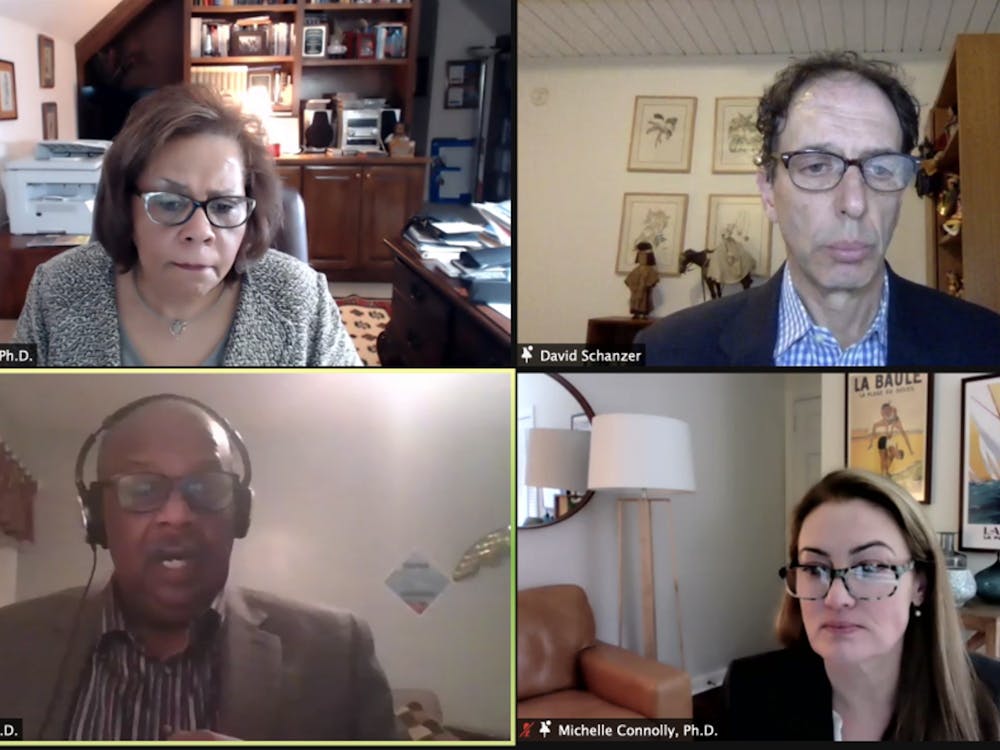Duke professors weighed in on the challenges facing the Biden administration, from racial justice to stimulus packages and foreign policy, in a Tuesday event.
The “Policy, Politics, and Promises: Biden’s First Month” panel was the first of the Duke Alumni Forever Learning Institute’s new series titled “America Today” which highlights current headline issues in the country. It was moderated by Paula McClain, dean of the Graduate School, and included David Schanzer, professor of the practice in the Sanford School of Public Policy, Kerry Haynie, associate professor of political science and Michelle Connolly, professor of the practice of economics.
“After an historic battle for the White House, Joe Biden became the 46th president of the U.S. on January 20 with unprecedented challenges to tackle in his first days in office,” McClain said to start the panel discussion.
Having worked in both the Senate and House wings of the U.S. Capitol, Schanzer described his shock at the January 6th storming of the building.
“It always felt like a safe place to work, and I think that is forever damaged. And that’s a real tragedy, because one of the hallmarks of our democracy is its openness,” he said.
Schanzer talked about how fighting white supremacy and racial injustice has been one of Biden’s priorities since day one, and that the Capitol riot “ratified” him as the leader the country currently needs.
Haynie added that racial bias factored into the riot, expressing surprise that more shots were not fired and attributing it to the fact that many of the rioters were white.
“I thought, had those been folks that were a different color, we’d be talking about a different set of circumstances now, I think,” Haynie said.
He mentioned that racial disparities have already been seen with regards to which detainees from the riot have been prosecuted more heavily.
President Biden will try to equally prosecute those who participated, but it remains to be seen if he will be able to fully dismantle racial inequalities in the justice system, Haynie noted.
“It’s not clear how much of the law can be brought to bear,” he said.
Connolly was asked about the $1.9 trillion COVID-19 relief package currently being pushed through Congress. The narrow Democratic majority in the Senate is attempting to use the reconciliation process to pass the bill to avoid a Republican filibuster, she said, but she is not sure this is a good idea.
“Nowadays we want to think very carefully about trying to change the current way in which decisions are made in Washington,” Connolly said.
Finding methods of passing legislation that bypass the need for bipartisan compromise may not set a good precedent, she continued, especially since the relief package initially had more Republican backing but has lost it as Democrats have decided against compromise.
“If there’s a way for Biden to do this in a more bipartisan way, it would probably be better for the economy, better for the country, better for our democracy,” Connolly said.
She said that using a 51-vote majority may serve the party’s short-term interests but is not guaranteed to pass the policies best for America at large.
Haynie disagreed, saying that under more ideal circumstances it would be good to seek bipartisan backing, but that this is unfeasible currently. “I think it’s in Biden’s interests to pass legislation however he can pass it,” Haynie said.
He argued that Republicans are now in a state of complete disarray, torn between those still trying to appease Trump’s base and those trying to break completely with the former president, and that this makes debate untenable at the moment.
“How do you negotiate with a party that’s in disarray?” he asked.
As the conversation turned from domestic to foreign policy, Schanzer mentioned the tendency of the Trump administration to “shake everything up” and disrupt established patterns.
“He had a fondness for dictators, whether they be in Turkey, Russia or Egypt, which was contrary to 60 years of American extolling of democracy abroad,” Schanzer said. He talked about how President Biden is trying to return to the status quo of the liberal international order, with America as a global leader in areas from the World Health Organization to the Paris Climate Accords, both of which Trump exited.
He also brought up current tensions with China, noting that “flashpoints” from Taiwan to the genocide of the Uighur people make political conflict inevitable.
“Thinking through that and figuring out what our general posture is, let alone individualized policies, is a huge challenge,” Schanzer said.
Connolly added an economic perspective, saying that trade policy with China has increasingly become a national security issue.
“We’re kind of at different stages, reliant upon each other but fearful of each other, and that is not an easy thing to solve,” Connolly said, as questions proliferate regarding national security questions in deals with Chinese telecom companies.
However, she asserted that the Biden administration should reopen America’s economy to the world “in every way,” as the global economy we now live in plays a fundamental role in upholding the country’s high standard of living.
“We cannot be on our own,” Connolly said, adding that reintegration with the world must be a priority for President Biden, as economic interdependence can even help lessen tensions with adversaries such as China. “Trade prevents wars.”
The event was hosted by the Forever Learning Institute in conjunction with the Program in American Grand Strategy.
Get The Chronicle straight to your inbox
Signup for our weekly newsletter. Cancel at any time.

Parker Harris is a Trinity senior and an editor at large of The Chronicle's 118th volume.

